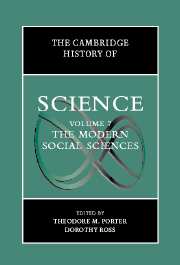Book contents
- Frontmatter
- 1 Introduction: Writing the History of Social Science
- PART I SCIENCES OF THE SOCIAL TO THE LATE NINETEENTH CENTURY
- PART II THE DISCIPLINES IN WESTERN EUROPE AND NORTH AMERICA SINCE ABOUT 1880
- 13 Changing Contours of The Social Science Disciplines
- 14 Statistics and Statistical Methods
- 15 Psychology
- 16 Economics
- 17 Political Science
- 18 Sociology
- 19 Anthropology
- 20 Geography
- 21 History and the Social Sciences
- PART III THE INTERNATIONALIZATION OF THE SOCIAL SCIENCES
- PART IV SOCIAL SCIENCE AS DISCOURSE AND PRACTICE IN PUBLIC AND PRIVATE LIFE
- Index
- References
14 - Statistics and Statistical Methods
from PART II - THE DISCIPLINES IN WESTERN EUROPE AND NORTH AMERICA SINCE ABOUT 1880
Published online by Cambridge University Press: 28 March 2008
- Frontmatter
- 1 Introduction: Writing the History of Social Science
- PART I SCIENCES OF THE SOCIAL TO THE LATE NINETEENTH CENTURY
- PART II THE DISCIPLINES IN WESTERN EUROPE AND NORTH AMERICA SINCE ABOUT 1880
- 13 Changing Contours of The Social Science Disciplines
- 14 Statistics and Statistical Methods
- 15 Psychology
- 16 Economics
- 17 Political Science
- 18 Sociology
- 19 Anthropology
- 20 Geography
- 21 History and the Social Sciences
- PART III THE INTERNATIONALIZATION OF THE SOCIAL SCIENCES
- PART IV SOCIAL SCIENCE AS DISCOURSE AND PRACTICE IN PUBLIC AND PRIVATE LIFE
- Index
- References
Summary
Statistics assumed its recognizably modern disciplinary form during the period from about 1890 to 1930. These dates are comparable to those for the formation of disciplines in the leading fields of social science. Statistics, however, changed during this period from an empirical science of society, as it had been during the nineteenth century, into a mathematical and methodological field. Although it disappeared as a social science per se, as an area of applied mathematics it became an important source of tools, concepts, and research strategies throughout the social sciences. It also provided legitimacy for, and contributed to a redefinition of what would count as, social knowledge.
In its nineteenth-century incarnation, as itself a social science, statistics was guided by a different set of ideals – not academic detachment, but active involvement in administration and social reform. The social science of statistics was practically indistinguishable from government collection of numbers about population, health, crime, commerce, poverty, and labor. Even its most self-consciously scientific advocates, such as the prominent Belgian astronomer and statistician Adolphe Quetelet (1796–1874), often had administrative responsibility for the organization of official statistics. This alliance of scientific and bureaucratic statistics did not disappear abruptly. But it was gradually subordinated to a new order in which statisticians assumed consulting roles, offering their expertise to statistical agencies but also to many others. At the end of the nineteenth century, it still appeared possible that statistics might succeed in the universities as a quantitative social science. Instead, it was recreated as a mathematical field.
- Type
- Chapter
- Information
- The Cambridge History of Science , pp. 238 - 250Publisher: Cambridge University PressPrint publication year: 2003
References
- 9
- Cited by

